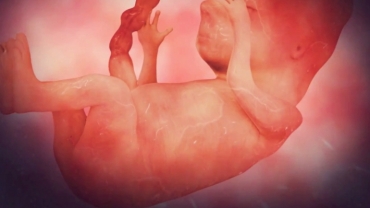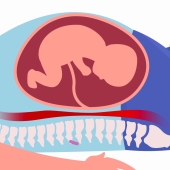One of the first clear signs of pregnancy: “morning sickness.” It’s like a hangover without the fun night before. What is it? What causes it? How to make it stop? Bekah and Kate tell you more!
What Is Morning Sickness? That phrase simply describes the nausea and vomiting that happens during pregnancy, though it can be misleading. “It’s a bit of a misnomer; it can happen any time, day or night,” Dr. Lang says. For most women, the symptoms start around the fifth or sixth week of pregnancy, reaching a peak around week nine. There’s there’s typically a slow (sometimes excruciatingly slow!) decline, until you should be feeling more like yourself around week 15.
Alas, a few women aren’t so lucky—one in five are still feeling sick in the third trimester. About five percent of women struggle all the way through to delivery. That’s normal, too.
So if you’ve felt pretty much fine through the beginning of your pregnancy and then are struck by stomach flu-like symptoms in the second or third trimester, it could be the sign of illness or even food poisoning. Tell your healthcare practitioner about any sudden or uncomfortable physical changes you experience.
Should I Worry? There’s no connection between feeling awful and risk to your developing baby. That queasiness could even be protective, Dr. Lang says. “Women who experience nausea and vomiting are less likely to experience miscarriage. Evolutionarily, it may be a protective way to avoid harmful toxins.”
You should tell your healthcare practitioner about any physical changes you experience. Still, they will probably say there’s no reason for concern unless symptoms become severe—if you’re vomiting multiple times a day, for several days in a row, for example. That could be the sign of a potentially dangerous medical condition called hyperemesis gravidarum (HG).
Other symptoms of HG include urine that’s very dark and concentrated-looking (a sign of dehydration), sudden feelings of dizziness or quick weight loss—more than five pounds. In these cases, “don’t tough it out,” Dr. Lang says. “Bring it to your doctor’s attention.”
What Causes Morning Sickness? It’s actually a bit of a mystery, according to Dr. Lang. “It can be triggered by a number of things that are unique to each woman.” What’s probably true, she says, is that it’s some combination of all of them. For example: food/odors, mind/body, hormones, etc.
What Can I Do to Make It Stop? The only real way out of morning sickness is to get through it, but you can take steps, in the meantime, to alleviate your symptoms:
Sleep: “Getting good sleep, as much as you can, is an excellent place to start,” Dr. Lang says. Also: eat, drink, and move!
While it’s easy to wish that there were magic remedies for morning sickness, there is one bright side: this is definitely a case where time can heal. In most cases, the queasiness is a long-distant memory by the time your baby is a few weeks old.
- 2265 views













